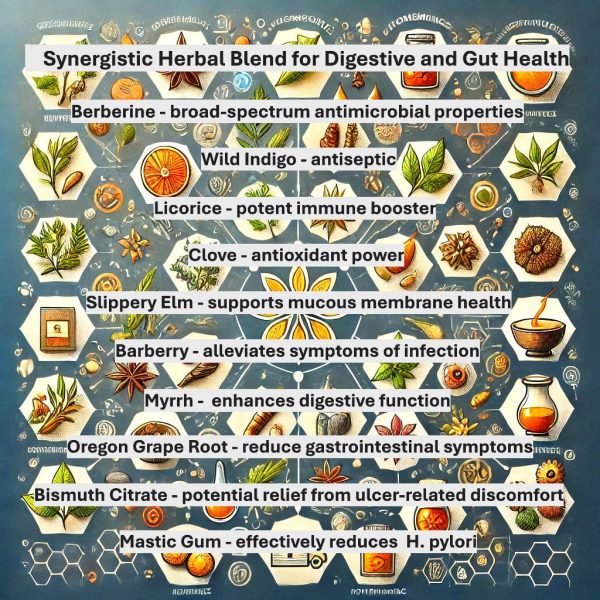Synergistic Herbal Blend for Digestive and Gut Health

A robust digestive system is foundational for overall health. This herbal blend combines traditional remedies and modern insights to support gut health, immune function, and microbial balance. Each component offers unique benefits that, when combined, create a holistic approach to digestive wellness.
The Components of the Blend
Berberine
- Source: Derived from plants like Berberis species.
- Benefits: Berberine is known for its broad-spectrum antimicrobial properties, which help maintain microbial balance in the gut and support overall gut health.
Wild Indigo (Baptisia tinctoria)
- Benefits: Celebrated for its antiseptic qualities, this herb supports cellular metabolism and tissue health, enhancing the body's ability to repair and maintain itself.
Licorice (Glycyrrhiza glabra)
- Benefits: A potent immune booster, licorice stimulates natural killer cell production and provides protection against oxidative stress, promoting cellular longevity and health.
Clove (Syzygium aromaticum)
- Benefits: Known for its antioxidant power, clove combats oxidative stress and offers antibacterial properties to protect against harmful microbes.
Slippery Elm (Ulmus rubra)
- Benefits: Renowned for supporting mucous membrane health, slippery elm soothes the gut lining and reduces irritation, making it invaluable for individuals with digestive discomfort.
Barberry (Berberis vulgaris)
- Benefits: Supports digestive health and alleviates symptoms of infection or gastrointestinal discomfort, particularly helpful for individuals with chronic digestive challenges.
Myrrh (Commiphora myrrha)
- Benefits: This ancient remedy enhances digestive function and protects the gastric mucosa, alleviating irritation and discomfort while promoting overall gut wellness.
Oregon Grape Root (Mahonia aquifolium)
- Benefits: Often used to reduce gastrointestinal symptoms, Oregon grape root cleanses the digestive tract and alleviates ulcers and acid reflux.
Bismuth Citrate
- Benefits: An essential component for fighting infection-causing organisms, bismuth citrate provides potential relief from ulcer-related discomfort while supporting gut integrity.
Mastic Gum
- Benefits: A traditional remedy for gut health, mastic gum effectively reduces Helicobacter pylori, a common cause of ulcers and digestive distress.
How They Work Together
This blend targets digestive health through multiple mechanisms:
- Antimicrobial Support: Berberine, clove, and myrrh combat harmful bacteria and promote a balanced microbiome.
- Tissue Repair: Wild indigo and licorice enhance cellular and tissue health, ensuring gut resilience.
- Soothing Action: Slippery elm and mastic gum provide a protective layer to the gut lining, reducing irritation.
- Digestive Cleansing: Oregon grape root and barberry aid in detoxifying the digestive tract, preventing infections.
Applications and Use
This blend is ideal for individuals experiencing:
- Gastrointestinal discomfort or inflammation
- Microbial imbalances in the gut
- Digestive irritation due to stress or poor diet
- Symptoms of H. pylori infection or ulcers
It’s also suitable for those seeking to maintain optimal gut health as part of their wellness routine.
References
- Berberine:
- Li, H., et al. (2014). Berberine: A potential multipotent natural product to regulate gut microbiota. Frontiers in Microbiology, 5, 420.
- Imenshahidi, M., & Hosseinzadeh, H. (2016). Berberis vulgaris and berberine: An update review. Phytotherapy Research, 30(11), 1745-1764.
- Wild Indigo (Baptisia tinctoria):
- Bradley, P. R. (Ed.). (1992). British Herbal Compendium Volume 1. British Herbal Medicine Association.
- Licorice (Glycyrrhiza glabra):
- Wang, Z., et al. (2015). The antiviral and antimicrobial activities of licorice, a widely-used Chinese herb. Acta Pharmaceutica Sinica B, 5(4), 310-315.
- Clove (Syzygium aromaticum):
- Chaieb, K., et al. (2007). Antibacterial activity of clove essential oil against Gram-negative and Gram-positive bacteria. Journal of Medical Microbiology, 56(10), 1367-1374.
- Slippery Elm (Ulmus rubra):
- Ulbricht, C., et al. (2009). Slippery elm (Ulmus rubra): A systematic review of clinical evidence. Journal of Herbal Pharmacotherapy, 9(4), 349-362.
- Barberry (Berberis vulgaris):
- Amin, A., & Shah, S. (2015). Barberry as an effective natural medicine in treating digestive disorders. International Journal of Health Sciences, 9(4), 405-415.
- Myrrh (Commiphora myrrha):
- Dolara, P., et al. (2000). Antioxidant properties of Myrrh. Journal of Agricultural and Food Chemistry, 48(11), 5568-5572.
- Oregon Grape Root (Mahonia aquifolium):
- Singh, R., et al. (2016). Mahonia aquifolium and its therapeutic potential. Frontiers in Pharmacology, 7, 341.
- Bismuth Citrate:
- Graham, D. Y., et al. (1991). Antibacterial action of bismuth against Helicobacter pylori. Lancet, 337(8751), 1490-1493.
- Mastic Gum:
- Marone, P., et al. (2001). Antimicrobial activity of a natural resin mastic gum against Helicobacter pylori. Journal of Chemotherapy, 13(6), 611-614.
=======================
Recommended Product:
GI Clear 2 180 caps

